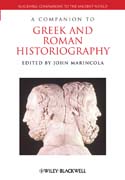
INDICE: Notes on Contributors. Preface. Acknowledgements. Ancient Authors: Abbreviations. Reference Works: Abbreviations. Introduction : John Marincola (Florida State University). Part I: Contexts:. 1 The Place of History in the Ancient World: Roberto Nicolai (University of Sassari). 2 The Origin of Greek Historiography: Catherine Darbo-Peschanski (École des Hautes Études en Sciences Sociales). 3 History and Historia: Inquiry in the Greek Historians: Guido Schepens (K. U. Leuven). 4 Documents and the Greek Historian: P. J. Rhodes (Formerly University of Durham). 5 The Prehistory of Roman Historiography: T. P. Wiseman (Formerly University of Exeter). 6 Myth and History: Suzanne Saïd (Columbia University). 7 The Construction of Meaning in the First Three Historians: Carolyn Dewald (Bard College). 8 Characterisation in Ancient Historiography: L. V. Pitcher (University of Durham). 9 Speeches in Greek and Roman Historiography: John Marincola (Florida State University). 10 Readers and Reception: A TextCase: A. J. Woodman (University of Virginia). Part II: Surveys:. 11 The Development of the War Monograph: Tim Rood (St Hughs College, Oxford). 12 Continuous Histories (Hellenika): Christopher Tuplin (University of Liverpool). 13 Universal History from Ephorus to Diodorus: John Marincola (Florida State University). 14 Local History and Atthidography: Philip Harding (University of BritishColumbia). 15 Western Greek Historiography: Riccardo Vattuone (University of Bologna). 16 The Greek Historians of Persia: Dominique Lenfant (University of Strasbourg (France)). 17 The Historians of Alexander: Andrea Zambrini (Università della Tuscia in Viterbo). 18 Greek Historians of the Near East: Clios Other Sons: John Dillery (University of Virginia). 19 The Greek Historians of Judaea: Gregory Sterling (University of Notre Dame). 20 The Greek Encounter with Rome: Christopher Pelling (University of Oxford). 21 The Early Roman Tradition:Hans Beck (McGill University in Montreal). 22 Memoirs and Autobiography in Repubican Rome: Andrew Riggsby (University of Texas at Austin). 23 Roman Historiography in the Late Republic: David Levene (New York University). 24 The Emperor and his Historians: John Matthews (University of Wales Swansea). 25 The Epitomising Tradition in Late Antiquity: Thomas Banchich (Canisius College in Buffalo, New York). Part III: Readings:. 26 To Each His Own: Herodotus and Simonides on Thermopylae: Pietro Vannicelli (University of Urbino). 27 Rhampsinitos and the Clever Thief (Herodotus 2.121): Stephanie West (Hertford College, University of Oxford). 28 The Enigma of Discourse: a View of Thucydides: Leone Porciani (University of Pavia at Cremona). 29 Contest (AgMn) in Thucydides: Donald Lateiner (Ohio Wesleyan University). 30 Narrative Manner and Xenophons More Routine Hellenica: Vivienne Gray (University of Auckland, New Zealand). 31 Fortune (tych ) in Polybius: Frank Walbank (Previously of the University of Liverpool). 32 Polybius and Aetolia: A Historiographical Approach: Craige Champion (Syracuse University). 33 Diodorus Siculus on the Third Sacred War: Peter Green (University of Texas at Austin). 34 Clothing Cincinnatus: Dionysius of Halicarnassus: Clemence Schultze (University of Durham). 35 Caesars Account of the Battle of Massilia (BC 1.34-2.22): Some Historiographical and Narratological Approaches: Christina Shuttleworth Kraus (University of Yale). 36 The Politics of Sallustian Style: Ellen OGorman (University of Bristol). 37 The Translationof Catiline: Andrew Feldherr (Princeton University). 38 Claudius Quadrigariusand Livys Second Pentad: Gary Forsythe (Texas Tech University). 39 Fog on theMountain: Philip and Mt. Haemus in Livy, 40.21-22: Mary Jaeger (University ofOregon). 40 The Imperial Republic of Velleius Paterculus: Alain Gowing (University of Washington in Seattle). 41 Josephus and the Cannibalism of Mary (B.J.6.199-219): Honora Howell Chapman (California State University, Fresno). 42 Quintus Curtius Rufus on the Good King: The Dioxippus Episode in Book 9.7.16-26: Elizabeth Baynham (University of Newcastle, Australia). 43 Tacitus and the Battle of Mons Graupius: An Historiographical Road Map? Rhiannon Ash (University College London). 44 Feast Your Eyes on This: Vitellius as a Stock Tyrant (Tac. Hist. 3.36-39): Elizabeth Keitel (University of Massachusetts at Amherst). 45 Arrian, Alexander and the Pursuit of Glory: A. B. Bosworth (University of Western Australia). 46 Towards a Literary Evaluation of Appians Civil Wars, Book 1: Gregory Bucher (Creighton University). 47 Cassius Dio: A Senator and Historian in the Age of Anxiety: Martin Hose (Ludwig-Maximilians Universität, Munich). 48 Ammianus Roman Digressions and the Audience of the Res Gestae: David Rohrbacher (New College of Florida). 49 To Forge their Tongues to Grander Styles: Ammianus Epilogue: Gavin Kelly (University of Edinburgh). Part IV: Neighbours:. 50 History and Epic at Rome: Matthew Leigh (St. Annes College, Universityof Oxford). 51 History and Ethnography: Emma Dench (Birkbeck College, University of London). 52 History and Tragedy: Richard Rutherford (University of Oxford). 53 History and Biography: Philip Stadter (University of North Carolina atChapel Hill). 54 Antiquarianism and History: Benedetto Bravo (Previously of the University of Warsaw). 55 Geography and History: Johannes Engels (Institut für Altertumskunde at University of Cologne (Germany)). 56 History and Fiction: John Morgan (University of Wales Swansea). Part V: Transition:. 57 Late Antique Historiography, 250-650 CE: Brian Croke (Catholic Education Commission, Sydney). Bibliography. Index Locorum. Index
- ISBN: 978-1-4443-3923-9
- Editorial: Wiley-Blackwell
- Encuadernacion: Rústica
- Páginas: 752
- Fecha Publicación: 03/12/2010
- Nº Volúmenes: 1
- Idioma: Inglés
